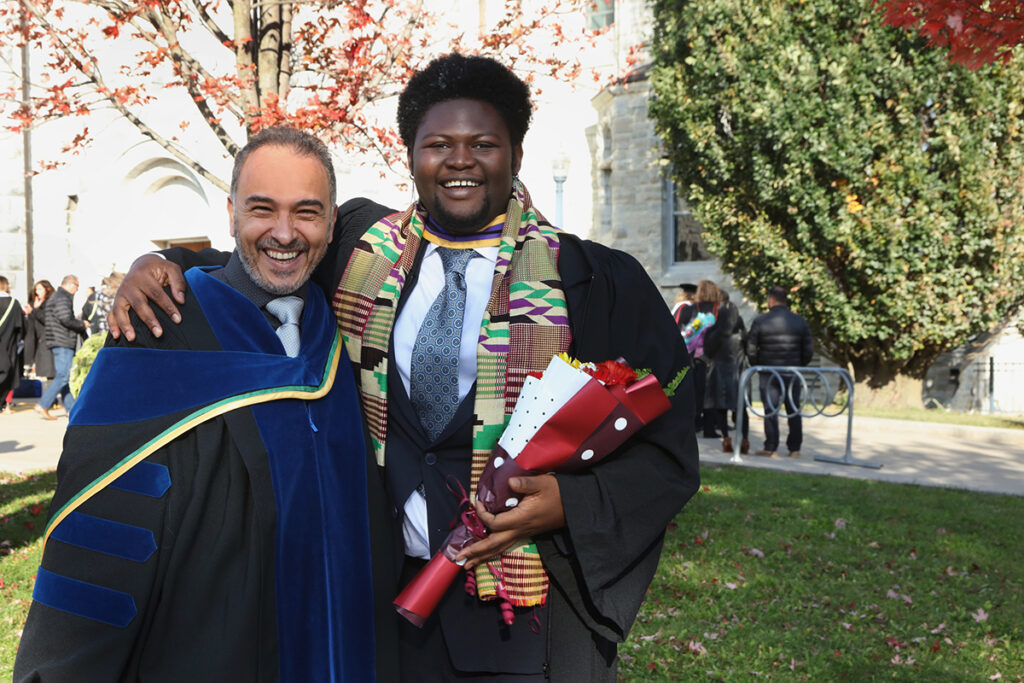During Fall convocation more than 2,500 graduates from seven faculties and schools crossed the stage and received their degrees. Among them was Nana Boateng, pictured here next to QSC School Director, Hossam Hassanein (left) moments after Nana crossed the stage to receive his Bachelor of Computing.
Every QSC graduate’s story at Queen’s is unique, and Nana is no exception. During high school Nana planned to study Computer Science at a different university in Ontario. He had successfully applied to and got accepted to his university of choice and was set on beginning his freshman year there, until one fateful day a friend of a friend of his said they were going to go to Queen’s and invited Nana to come with them to check out the Queen’s campus. Nana says that the moment he stepped on Queen’s campus. He could tell that was the right place for him. “It was like a night and day difference between the feeling that I got at the other campus and the feeling that I got when I saw Queen’s. Before I had this experience, I didn’t realize how important it is to visit the actual campus before you apply to a University program. I applied to Queen’s right away and I got into the computer science program.”

In his second year at QSC Nana started working in COMPSA as a marketing coordinator, until he ran for Presidency and got elected as COMPSA president the next year. That happened to be in the 2019-2020 Academic Year, around the same time as a change in policy made by the Ford Government meant that student-run organizations could no longer charge operating fees unless they fit certain parameters.
Nana says, “At first glance, it seemed like the change wouldn’t affect COMPSA too seriously, but after looking at our finances and the way that we were operating it became very clear that we needed to urgently shift our finances around to accommodate everyone. We made the decision to make the COMPSA fees optional for everyone, to make sure that our core programs like your academic tutorials, professional development programs and other things that are important and significant to the growth of the students would still be available to every student, whether they chose to pay or not. We created a new financial model where students could pay the organization fees to get extra stuff, like discounts on merchandise, or extra food tickets, things like that. This model made the essential services of COMPSA available to all students who needed them, while giving those who chose to pay access to some fun extra stuff.”
Around the same year is when COMPSA started planning and developing the console lounge.
“I love that students now have this space to just relax. It’s very helpful to their well-being.”
“Another project we had that I’m proud of is the peer-to-peer program that matches first year students with an upper-year mentor. I know firsthand how important that is, because when I started my degree I was in Computing and the Creative Arts, so I didn’t get any updates on what was going on in Computing specifically, until I connected with an upper-year student who could answer my questions, remind me of important deadlines, etc.”
“Our other big project was the redevelopment of the computing major. We talked about redesigning certain courses that needed to be updated to be relevant to current day technology.”
I asked Nana what made Queen’s Computing so special to him.
“I think the Queen’s computing program is one of the best programs. Other universities can sometimes have a culture where everyone is competing against each other. Kind of like a race at the top, whereas at Queen’s, everyone is helping each other out. Your classmates wouldn’t sabotage you to get a better grade than you do in a course, we are all learning together towards the same goal. And this collaborative feeling comes from the faculty, as well as the students. Even the way the QSC office is laid out, it’s an open concept where you can walk around and say hi to the staff. I did that a few times, that’s how I met Director Hassanein. The professors are genuinely interested in their subject area and interested in motivating you to learn more. I find that’s intrinsic to the School of Computing.”